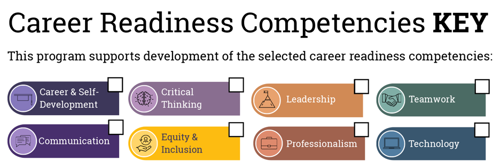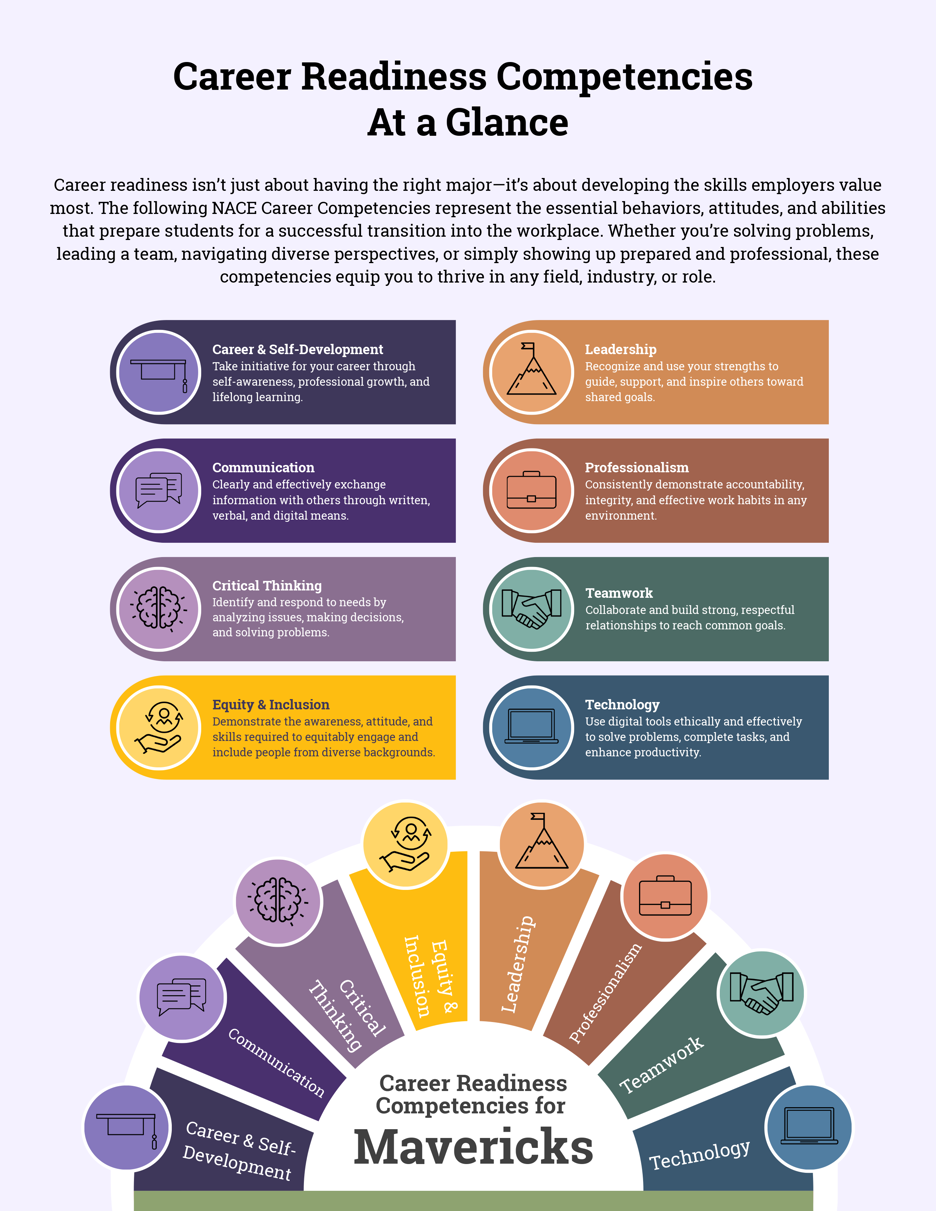Career Readiness Competencies
Career readiness isn’t just about having the right major—it’s about developing the skills employers value most. The NACE Career Competencies represent the essential behaviors, attitudes, and abilities that prepare students for a successful transition into the workplace. Whether you’re solving problems, leading a team, navigating diverse perspectives, or simply showing up prepared and professional, these competencies equip you to thrive in any field, industry, or role. Check out our Maverick images below to promote career competencies, and learn more here from NACE itself!
The Competency Event KEY
Download this image to include on every poster, syllabus, or marketing material for your event or class! Before uploading or saving the image for your specific use, be sure to check off - using the clickable buttons - which career competencies your experience will help students develop.

Download the Career Competency KEY
Competency Overview
1. Career & Self-Development
Proactively develop oneself and one's career through continual personal and professional learning, awareness of strengths and weaknesses, navigation of career opportunities, and networking to build relationships within and without one's organization.
Key Behaviors:
- Identify areas for professional growth and seek out opportunities for development.
- Establish and maintain relationships with professionals in the field.
- Set personal and professional goals and work towards achieving them.
2. Communication
Clearly and effectively exchange information, ideas, facts, and perspectives with persons inside and outside of an organization.
Key Behaviors:
- Articulate thoughts and ideas clearly and effectively in written and oral forms.
- Demonstrate public speaking skills and the ability to express ideas to others.
- Utilize active listening skills and provide feedback to others.
3. Critical Thinking
Identify and respond to needs based upon an understanding of situational context and logical analysis of relevant information.
Key Behaviors:
- Make decisions and solve problems using sound, inclusive reasoning and judgment.
- Gather and analyze information from a diverse set of sources and individuals to fully understand a problem.
- Proactively anticipate needs and prioritize action steps.
4. Equity & Inclusion
Demonstrate the awareness, attitude, knowledge, and skills required to equitably engage and include people from different local and global cultures.
Key Behaviors:
- Solicit and use feedback from multiple cultural perspectives to make inclusive and equity-minded decisions.
- Actively contribute to inclusive and equitable practices that influence individual and systemic change.
- Advocate for inclusion, equity, and social justice in the workplace.
5. Leadership
Recognize and capitalize on personal and team strengths to achieve organizational goals.
Key Behaviors:
- Inspire, persuade, and motivate self and others under a shared vision.
- Seek out and leverage diverse resources and feedback to inform direction.
- Use innovative thinking to go beyond traditional methods.
6. Professionalism
Understand and demonstrate effective work habits, and act in the interest of the larger community and workplace.
Key Behaviors:
- Act equitably with integrity and accountability to self, others, and the organization.
- Maintain a positive personal brand in alignment with organizational and professional standards.
- Demonstrate dependability and consistent work habits.
7. Teamwork
Build and maintain collaborative relationships to work effectively toward common goals, while appreciating diverse viewpoints and shared responsibilities.
Key Behaviors:
- Listen carefully to others, taking time to understand and ask appropriate questions without interrupting.
- Effectively manage conflict, interact with and respect diverse personalities, and meet ambiguity with resilience.
- Be accountable for individual and team responsibilities and deliverables.
8. Technology
Understand and leverage technologies ethically to enhance efficiencies, complete tasks, and accomplish goals.
Key Behaviors:
- Navigate change and be open to learning new technologies.
- Use technology to improve the efficiency and productivity of work.
- Identify appropriate technology for tasks and utilize it effectively.


